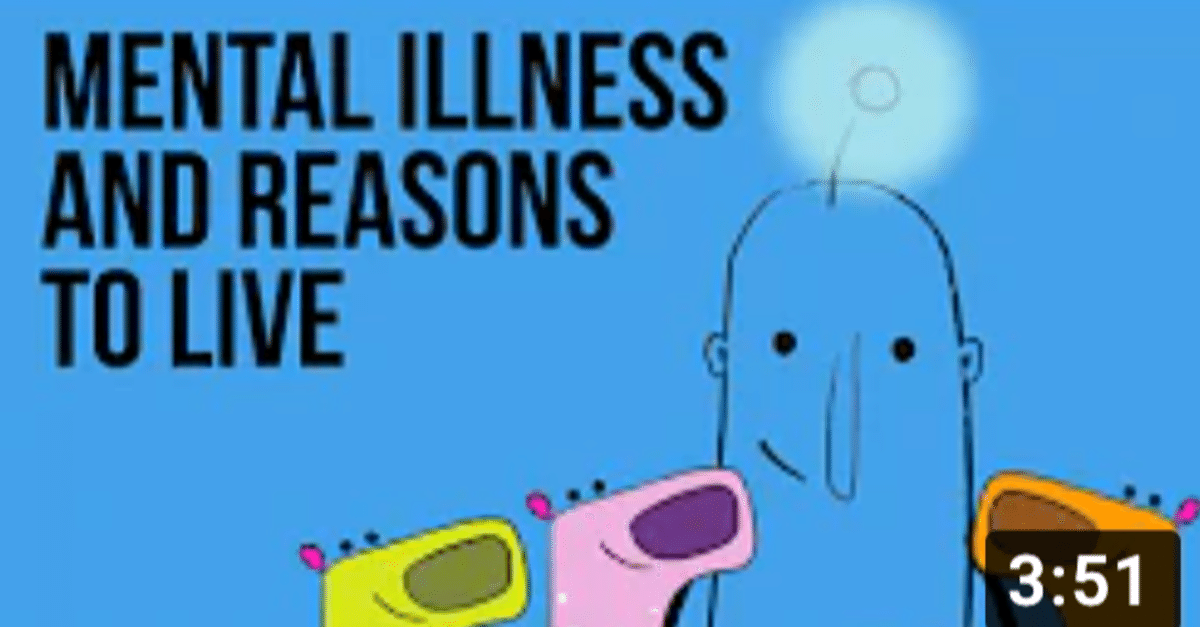
精神疾患と生きる理由
これは自分の文章ではなく、Youtube "Mental Illness and Reasons to Live" (by The School of Life) の日本語訳です。
*English subtitle follows
心の調子がいいときには、「生きる理由」などという堅苦しい、あるいは大げさな響きを持つものを自分の中に抱えていることに、ほとんど気がつきません。
私たちは、人生そのものが好きであり、そうすることが自然であり、必然であると考えています。
しかし、よくよく考えてみると、大まかな人生への欲求は、決して単純なものではありません。一見、大まかな人生への欲求は、密かに様々な具体的な要素の上に成り立っているはずで、それらの要素は、わざわざ箇条書きにする必要はないかもしれませんが、独自の明確なアイデンティティを持っています。
危機が訪れて気分が落ち込んだときに初めて 危機的状況に陥り、気分が落ち込み始めたとき、初めて私たちは 生きる理由」とは何だったのか、ということを痛切に感じ始めるのです。
生きる理由」とは何だったのか。生きる理由を失った時にこそ、その理由が明らかになるのです。理由を失ったとき、私たちはそれらを並外れた明確さで理解します。
私たちは、なぜ何年もベッドから元気に起き上がることができずに 元気にベッドから起き上がって、比較的ユーモアがあって 不便なことを我慢して、人に自分を伝えるのに苦労して 苦労して人に自分を伝え、明日を楽しみにしていたのに 明日を楽しみにしていたのかに気付きます。これから先、どうやって意志と勇気を持って そして、これから先、どのようにして継続する意志と勇気を持つことができるのだろうか、と呆然とする。
私たちの人生への関わりは、仕事の楽しさや 仕事の楽しさや評判の良さ。子供や友人との交友関係。体の敏捷性や心の創造性 心の創造性 そのような利点を失った私たちは、単に人生の一面を失っただけではありません。人生の一面が失われるだけでなく、人生全体が目的を失ってしまう。人生全体が目的を失ってしまうのです。
二次的な充足感 - 休暇や本、旧友との食事や趣味など、二次的な満足感は得られません。二次的な満足感では補えません。それを補うことはできません。私たちの生活の快楽的足場は崩壊します。人生の足場が崩壊してしまうのです。積極的に自殺しようとは思いませんが、生きているとは言えない。私たちは動作をしているだけです。意味のない台本に従った生ける屍のようなものです。意味を失っている。
生きているとは言えない。私たちは動作をしているだけです。意味のない台本に従った生ける屍のようなものです。意味を失っている。
誰かが精神的に病んでしまったと言うとき
私たちが「精神的に病んでしまった」と言うとき、よく指摘されるのは 生きている理由を失ったことです。
だからこそ、これからの課題は、大切なものとしての介入を重ねていくことなのです。
恐ろしいほどの愚かさを持つ自分自身を許す必要があるかもしれません。自分の愚かさを許し、自分は特別な存在だと思うことをあきらめ、世俗的な野心を捨て、自分の心が期待したほど論理的で信頼できるものだと考えることをきっぱりとやめる必要があるかもしれません。
私たちはただ、すべての人間が理解されるべきであり、私たちが知っている唯一の方法で最善を尽くしているからこそ、生き続けることができるのです。
最悪の精神的危機を経験することに利点があるとすれば、それは、その危機の反対側では 人生を選択したことになります。
そのような 暗闇から這い上がってきた私たちは、もしかしたら 百歩譲って不利益を被ることがあっても、少なくとも、なぜそのようなことになったのかを、自分がここにいる理由を、思い込みや継承ではなく、自分がここにいる理由を見つけなければならなかっただろう。
私たちが続ける毎日は、死と私たちの満足から取り戻された一日となるでしょう。一日一日が死から逃れるための一日となり、私たちの満足感はさらに高まり 意識的に行動したことで、満足感はさらに高まり、感謝の気持ちも深まるでしょう。意識的にたどり着いたことで、満足感はより強く、感謝の気持ちはより深くなるでしょう。
到達できたことへの感謝の気持ちがより一層強くなります。
現在の病気からの挑戦は それは、ある日突然、小さくても強くて説得力のある人たちを 小さくてもしっかりとした説得力のある 説得力のある、小さいながらもしっかりとした理由のリストを 続ける理由に到達することです。
-English subtitle
When we are feeling well in our minds, we hardly notice that we might be harbouring in ourselves anything as formal or as dramatic-sounding as ‘reasons to live.’
We simply assume that we like life itself and that it must be natural and inevitable to do so.
And yet a broad appetite for life is, on close inspection, never simply that; our apparently general buoyancy must covertly rest on a range of specific elements that, while we may not bother to itemise them, have their own and distinct identities nevertheless.
It’s only when a crisis hits and our mood starts to drop that we may for the first time start to feel, with acute sorrow, what these
‘reasons to live’ might have been all along; it’s as we lose our reasons that we understand them with uncommon clarity.
We realise why we have for years bothered to rise out of bed with energy and relative good humour, put up with inconveniences, struggled to get ourselves across to others and looked forward to tomorrow - and wonder in dismay how we will from now on ever have the will and courage to continue.
Our engagement with life might have been bound up with, the enjoyment of work or of reputation, the companionship of a child or of a friend, the agility of our bodies or the creativity of our minds. Denied such advantages, we don’t merely miss out on an aspect of life, the whole of it loses its purpose.
Secondary satisfactions - whether from a holiday or a book, a dinner with old acquaintances or a hobby - cannot compensate. The hedonic scaffolding of our lives disintegrates. We may not actively try to kill ourselves, but we can’t count as quite alive either. We are going through the motions; living corpses following a script drained of meaning.
When we say that someone has fallen mentally ill, what we are frequently pointing to is the loss of long-established reasons to remain alive.
And so the task ahead is to make a series of interventions, as what counts.
We may need to forgive ourselves for a fearsome degree of idiocy, give up on a need to feel exceptional, surrender worldly ambitions and cease once and for all to imagine that our minds could be as logical or as reliable as we had hoped.
We may continue to live simply because every human deserves understanding - and because we are trying our best in the only way we know how.
If there is any advantage to going through a mental crisis of the worst kind, it is that - on the other side of it - we will have ended up choosing life rather than merely assuming it to be the unremarkable norm.
We, the ones who have crawled back from the darkness, may be disadvantaged in a hundred ways, but at least we will have had to find, rather than assumed or inherited, some reasons why we are here.
Every day we continue will be a day earned back from death and our satisfactions will be all the more more intense and our gratitude more profound for having been consciously
arrived at.
The challenge from the present sickness can be mapped out in its essential form: one day to reach a small but robust and persuasive list of reasons to continue to be.
この記事が気に入ったらサポートをしてみませんか?
